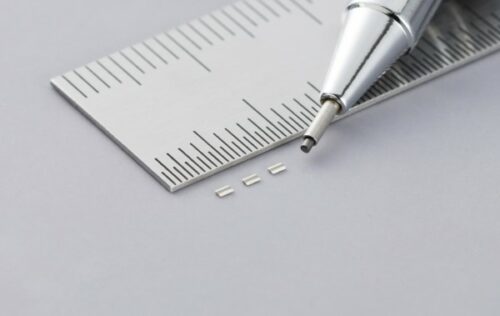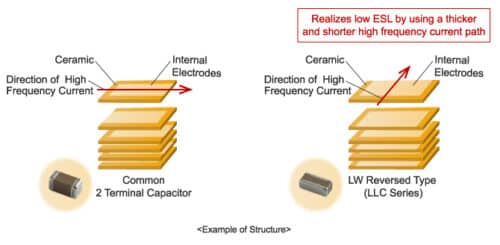LLC series utilises advanced technologies to cut component height by 20%, enabling capacitors on the reverse side of boards near solder ball terminations, optimising power rail decoupling, reducing component costs, and enhancing reliability.

By introducing their LLC (Inductor-Inductor-Capacitor)series, Murata has become a leading manufacturer of multi-layer ceramic capacitors designed for automotive applications. These components are distinguished by a unique reversed termination, resulting in low equivalent series inductance (ESL). They are packaged in an industry-first ultra-slim profile of just 0.18mm. These capacitors are currently the smallest available market with a compact footprint measuring only 0.5 x 1.0mm for a 1µF capacitance.
Main features and specifications include:
- Rated Voltage 2.5Vdc – 4Vdc
- Capacitance 1.0μF
- Low ESL
- AEC-Q200 Compliance
The LLC series leverages exclusive thin-layer shaping, high-precision lamination technology, and advanced material atomisation and homogenisation methods. This combination results in a notable 20% reduction in component height compared to previous offerings. This reduction creates new possibilities for seamlessly integrating capacitors on the reverse side of circuit boards, even amidst solder ball terminations. Placing these components in optimal positions for processor power rail decoupling near the semiconductor die becomes achievable. Consequently, this approach enables fewer capacitors, saves costs, and enhances system reliability.
Enhancing Efficiency for Automotive ADAS
With its low Equivalent Series Inductance (ESL) and excellent high-frequency characteristics, this capacitor is well-suited for power supply decoupling in high-speed electronic equipment, contributing to a reduction in the overall component count. Low ESL capacitors reduce components while maintaining functionality equivalent to standard 2-terminal capacitors. In addition to their low Equivalent Series Resistance (ESR), the decrease in Equivalent Series Inductance (ESL) results in a lowered high-frequency impedance in these capacitors. This enhancement in circuit performance is well-suited to fulfilling the demands of contemporary, low-voltage, compute-intensive applications, such as automotive advanced driver-assistance systems (ADAS).
The escalating demands for advanced driver assistance systems (ADAS), safety features, and in-vehicle infotainment (IVI) with enhanced functionality drive the need for processors with higher performance and smaller form factors in the automotive industry. Low-ESL capacitors have become essential for decoupling processor power supplies in this market. Our low-ESL capacitors adhere to the automotive industry’s stringent testing conditions, with a maximum operating temperature of 125°C.

The automotive-grade LLC series is fully compliant with the rigorous AEC-Q200 standards. It successfully passed the 1000 temperature cycle and the temperature/humidity endurance test, enduring conditions of 85°C at 80-85% humidity for 1000 hours. These technologies, including ADAS processors, camera sensors, radar systems, and Lidar, enhance automotive safety and enable effective vehicle detection and response. ADAS processors provide lane-keeping and adaptive cruise control, while camera sensors capture vital visual data. Radar systems aid collision avoidance, and Lidar offers precise 3D mapping, crucial for autonomous vehicles and robotics, revolutionising navigation and safety.







